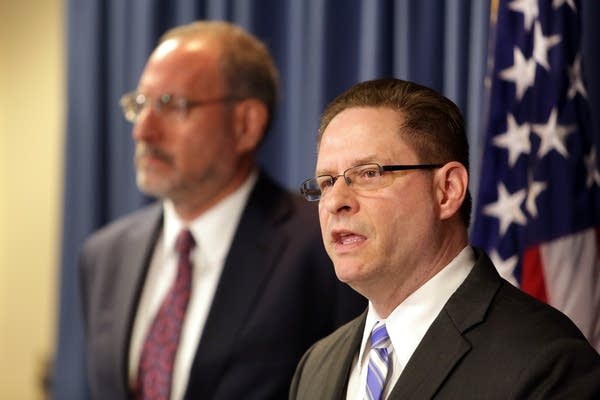Minnesota FBI: Terror arrests haven't stopped travel plots
Like this?
Log in to share your opinion with MPR News and add it to your profile.
Like this?
Thanks for liking this story! We have added it to a list of your favorite stories.

The high-profile arrests of six Minneapolis-area men charged with plotting to join the Islamic State group haven't stopped others from aspiring to do the same, and some are planning trips "as we speak," the head of the FBI in Minnesota said Wednesday.
In an interview with The Associated Press, FBI Special Agent in Charge Richard Thornton spoke about the ongoing investigation.
The investigation
Support the News you Need
Gifts from individuals keep MPR News accessible to all - free of paywalls and barriers.
Minnesota is home to the largest Somali community in the United States and has been targeted by recruiters for terrorist groups — first for al-Shabab and now for IS.
About a dozen Minnesota residents have traveled to Syria to join jihadist groups since late 2013 and eight others who allegedly conspired to make the trip are being prosecuted in U.S. District Court. A "significant number" of people are also being investigated for expressing an interest in traveling there, Thornton said, declining to provide specific numbers because of the active investigation.
"There are people in this community that are at various stages along the path to traveling as we speak," he said. "I can't tell you if there is one on an airplane as we speak, necessarily, but the arrests and the other activities have not stopped the activity across the board."
He added that it would be naive to assume that the FBI knows of every person with these aspirations: "Intuitively, we know that the threat is bigger than what we've currently defined it as."
Is Minnesota at risk?
When asked about the possibility of an attack in Minnesota, Thornton said every place is at risk.
He said incidents elsewhere have shown that a person can go from being nonviolent to carrying out an attack in a short period of time, even days. In addition, there is concern that someone who was prevented from traveling to a jihad overseas may instead choose to act at home, as IS has called for supporters to do in its videos and other online propaganda.
"That message doesn't have to resonate with five or ten or 100 people," Thornton said. "It only has to resonate with one to call them to action."
Thornton said the biggest fear is that someone who is not on the authorities' radar will get radicalized and quickly motivated to carry out an attack.
"Not being in a position to disrupt or prevent a catastrophic event, I think, keeps us all awake at night," he said.
Authorities at work
To try to prevent that from happening, Minnesota's FBI office is creating another squad focused on international terrorism. Thornton said this squad, which was approved over the summer, will act as a triage unit to quickly assess new information and determine if someone poses a threat that requires immediate action.
While agents have been doing that type of assessment all along, this unit will allow investigators to focus primarily on new leads without the distraction of ongoing cases. The idea is to give every new piece of information a high priority.
"We are trying to make sure we are structurally sound so the chance of something falling through cracks and not getting attention it deserves is minimized or eliminated," Thornton said.
The FBI has also added more local authorities to the joint terrorism task force and is "surging resources ... to do everything we can to ensure that the people of Minnesota are as safe as they can be from this threat," he said.


